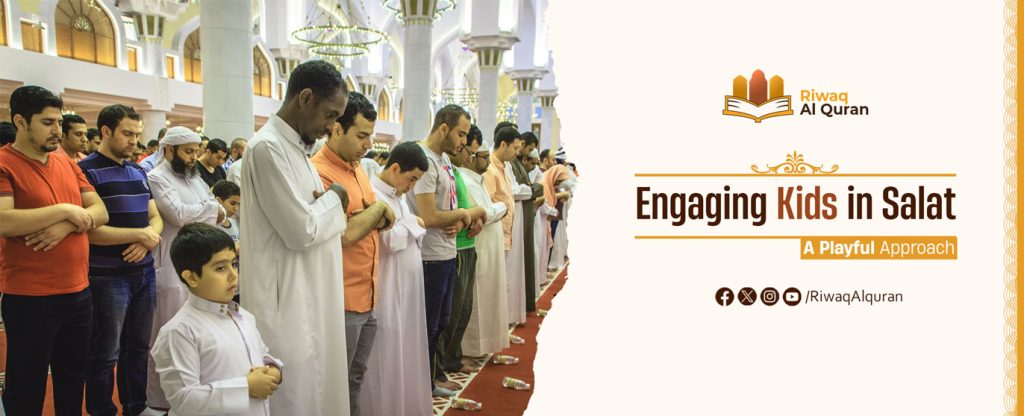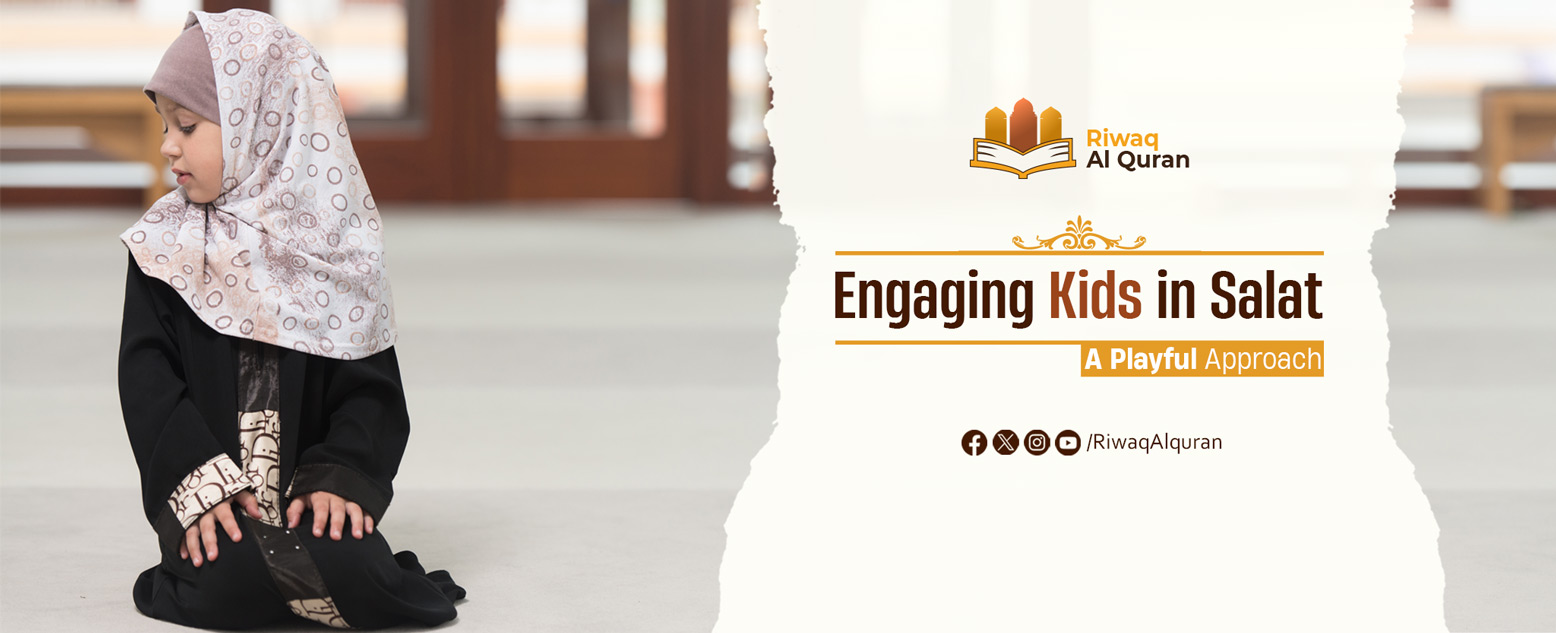Teaching kids Salah can be a joyful journey when approached with creativity and patience. Start by introducing prayer as a special conversation with Allah, using stories, visuals, and interactive activities to make it engaging. Encourage consistency with a simple routine, practice together as a family, and celebrate their progress with positive reinforcement.
Creating a dedicated prayer space and explaining the meaning behind each step helps children connect deeply with Salah. By making prayer a positive experience, children develop a lifelong habit of worship, discipline, and spiritual fulfillment.
Salat, or prayer, is one of the five pillars of Islam and holds immense significance in a Muslim’s life. For children, understanding and performing Salat can be a beautiful journey of faith and discipline.
But, let’s face it, getting kids excited about prayer can be a bit of a challenge. So, how do we make Salat engaging and meaningful for them? This guide is packed with fun activities, steps of Salah practical tips, and insights to help your kids embrace the beauty of Salat.
Table of Contents
Prayer Times for Kids
Introducing children to prayer times helps them understand the importance of Salah in daily life. Although children are not required to pray the five daily prayers until they reach puberty, familiarizing them with prayer times helps build a routine and instill a sense of discipline.
Each prayer is performed at specific times. These times serve as regular intervals to reconnect with Allah and center oneself spiritually:
- Fajr: Before dawn
- Dhuhr: After midday
- Asr: Mid-afternoon
- Maghrib: Just after sunset
- Isha: Night
How to Teach a Child to Pray in Islam?
Teaching a child to pray in Islam is a profound and rewarding journey. It involves not only educating them about the ritual and its significance but also nurturing a spiritual connection with Allah.
Praying is one of the five pillars of Islam and forms the foundation of a Muslim’s daily life. This guide aims to offer practical advice for teaching children how to pray, ensuring they grow up with a solid understanding and appreciation of Salah.
1. Understanding the Importance of Prayer
Begin by teaching the child about the importance of prayer in Islam and its role in connecting with Allah. Use simple, age-appropriate language to explain that prayer is a way to communicate with Allah and seek His guidance.
2. Introducing the Basics of Prayer
Teach the child the basic concepts of prayer, such as the different positions (standing, bowing, and prostrating) and the key phrases used in prayer (e.g., “SubhanaAllah,” “Alhamdulillah,” “Allahu Akbar”). Demonstrate the prayer by showing each step clearly, breaking it down into smaller parts like Takbir (saying “Allahu Akbar”), Ruku (bowing), and Sujud (prostration).
3. Practicing the Prayer
Use visual aids, such as a prayer mat with labeled positions or a prayer chart, to help the child understand the different steps of the prayer. Encourage regular practice, starting with shorter prayers or parts of the prayer and gradually increasing the length and complexity as the child becomes more comfortable.
4. Making Prayer Enjoyable
Incorporate fun elements into the learning process, like rewards or praise, to make it enjoyable. You might use a sticker chart to track progress or offer small incentives for consistent practice. Pray together as a family to provide a supportive environment and create a positive association with prayer.
5. Reinforcing the Routine
Establish a consistent routine for prayer at regular times, helping to build a habit and make prayer a regular part of the child’s life. Discuss the spiritual and personal benefits of prayer, such as feeling closer to Allah, gaining peace of mind, and developing self-discipline.
6. Encouraging Personal Connection
Encourage personal reflection as the child grows, helping them understand the meanings of their prayers and deepen their connection to worship. Be open to answering any questions they may have about prayer or other aspects of Islam, providing clear and honest answers to build their understanding and commitment.
7. Using Stories and Examples
Share stories from the lives of the Prophets or Islamic history that highlight the importance and beauty of prayer. Real-life examples and stories can help the child relate to the practice of prayer and understand its significance in a more tangible way.
8. Creating a Prayer Space
Set up a dedicated prayer space in the home where the child can pray. This space should be clean, quiet, and comfortable, making it a special place for them to focus on their prayers and develop a sense of reverence and tranquility associated with worship.


How to pray in Islam for kids step by step?
Teaching children how to pray in Islam is an important part of their spiritual upbringing. Here’s a simple, step-by-step guide to help kids learn how to perform Salah. Teaching children how to pray in Islam is an important part of their spiritual upbringing. Please note that while some steps are compulsory, others are Sunnah but not compulsory.
Steps of Salah:
- Make the Intention
- Perform Wudu
- Stand Facing the Qibla
- Raise Hands and Say Takbir
- Recite Al-Fatihah
- Recite a Short Surah
- Ruku
- Stand Up Straight
- Sujood
- 10. Sit and Repeat Sujood
- Tashahhud
- End the Prayer with Tasleem
- Dua After Salah
For detailed information, this step-by-step guide will help children understand and practice the essential elements of Salah, laying a strong foundation for their faith.
Can Kids Pray Salah in English?
While Salah is traditionally performed in Arabic, the movements can be introduced or explained to children in their native language initially to understand the beauty of prayer. Then, it’s important to teach them the Arabic text of the prayers step-by-step to perform it correctly. Here are some quick steps:
- Introduction: Begin by explaining the prayers and their meanings in English.
- Transition: Gradually introduce the Arabic phrases alongside with English.
- Practice: Encourage children to memorize and recite the prayers in Arabic.
- Support: Use resources such as transliterations and phonetic guides.
Riwaq Al Quran offers a special online Arabic course designed to help learners of all ages grasp the beauty and nuances of the Arabic language. The course focuses on basic phrases and dialouges in Arabic, along with grammar, listening, and speaking actvities to support learning. This approach helps learners build a solid foundation in Arabic, enhancing their understanding and ability to use the language effectively.
You can also enroll in our online Arabic course for kids that goes beyond the basics of reading and writing. Designed to be engaging and interactive, our classes are led by expert teachers who specialize in working with children. Through fun activities, storytelling, and interactive lessons, your child will not only learn to read and write in Arabic but also develop essential speaking and listening skills.
Is Prayer Obligatory on Kids?
In Islam, prayer becomes obligatory at the age of puberty. However, it is beneficial to start teaching children how to pray early to prepare them for this important duty.
Although Salah becomes mandatory once a child reaches puberty, introducing prayer practices early and encouraging them to pray helps develop a lifelong habit and understanding of this fundamental aspect of their faith.

Should Kids Pray the Missed Salah?
Children are not required to make up missed prayers until they reach puberty. However, teaching them about the concept of missed prayers and the importance of maintaining regular Salah can help instill a sense of responsibility. Here are some other benefits:
- Encourages discipline and routine
- Fosters a sense of accountability
- Strengthens connection with Allah
- Promotes spiritual growth
- Prepares them for adult responsibilities
What Are the Rewards of the Salah for Kids?
The rewards of Salah are numerous and significant, even for children. They include spiritual benefits, moral development, and a closer relationship with Allah.
1. Developing a Close Relationship with Allah
By praying regularly, children begin to build a personal connection with Allah. This connection fosters a deep sense of love, trust, and reliance on Allah from an early age, which can guide them throughout their lives.
2. Gaining Peace and Tranquility
Salah helps children experience inner peace and calmness by providing a moment of reflection and connection with Allah. This sense of tranquility teaches them the value of spiritual well-being and how to find peace amid life’s challenges.
3. Receiving Allah’s Blessings and Mercy
Regular prayer brings Allah’s blessings and mercy upon children, offering protection and guidance as they navigate their daily lives. These blessings can manifest in both their spiritual and worldly experiences, helping them grow into well-rounded individuals.
4. Building Good Habits from a Young Age
Praying consistently helps children develop discipline and strong moral habits. These habits, such as punctuality, responsibility, and mindfulness, will benefit them not only in their spiritual lives but also in their academic and social interactions.
5. Earning Rewards in This Life and the Hereafter
Salah offers children the opportunity to earn rewards both in this world and in the Hereafter. These rewards include the pleasure of Allah, a sense of fulfillment, and a strong foundation for a righteous and fulfilling life, both spiritually and morally.
6. Strengthening Family Bonds
Praying together as a family encourages unity and strengthens family bonds. When children see their parents and siblings praying, it reinforces the importance of Salah and creates a shared spiritual practice that brings the family closer.
7. Instilling a Sense of Purpose
Regular Salah helps children understand their purpose in life as Muslims. It teaches them that their actions, including prayer, are part of a greater plan and that they have a meaningful role in worshipping Allah and living according to His guidance.
8. Encouraging Moral Development
Through Salah, children learn essential moral values such as honesty, patience, and humility. These values are reinforced every time they pray, helping them grow into morally upright individuals who are mindful of their actions and their impact on others.


Explore Our Islamic Studies for Kids Course!
At Riwaq Al Quran, we provide a comprehensive and engaging Islamic Studies course designed specifically for children. Our expert teachers cover essential topics such as Salah, Quranic teachings, and Islamic morals in a fun and interactive way.
Enroll your child today to help them build a strong foundation in their faith and grow into confident, knowledgeable Muslims. The first trial class is totally for free!
We offer several courses such as:
- Online courses for kids.
- Online Quran classes for kids and adults.
- Online Arabic courses
- Online Ijazah courses
- Online Islamic Studies courses.
Here are a sample of our set of Quran Courses that will be helpful for you:
- Online Tafseer Course: Delve into Quranic meanings with our insightful online Tafseer course.
- Noorani Qaida Online: Learn Quranic basics efficiently through our Noorani Qaida online program.
- Online Quran Recitation Course: Enhance Quranic recitation skills through our expert-led online course.
- Online Tajweed Classes: Master Tajweed rules for beautiful Quranic recitation in online classes.
- Quran Memorization Online Course: Memorize the Quran effectively with our specialized online memorization course.
- Online Qirat Course: Explore diverse Qirat styles with our comprehensive online Qirat course.
Online Quran Classes for Kids: Nurture a love for the Quran in kids through interactive online classes.
Conclusion
Teaching children about Salah is a crucial aspect of nurturing their Islamic faith and spiritual growth. By making the process engaging and meaningful, we can help them develop a strong connection with Allah that will guide them throughout their lives. Incorporating fun activities, consistent routines, and clear explanations allows children to appreciate the significance of prayer and the rewards it brings, both in this life and the Hereafter.
As children grow, their understanding and commitment to Salah will deepen, shaping their moral values, discipline, and sense of purpose. By starting early and encouraging them to pray regularly, we lay the foundation for a lifelong devotion to Allah and instill habits that contribute to their overall well-being, both spiritually and morally. With patience, love, and guidance, we can help our children embrace Salah as a cherished part of their daily lives.


































